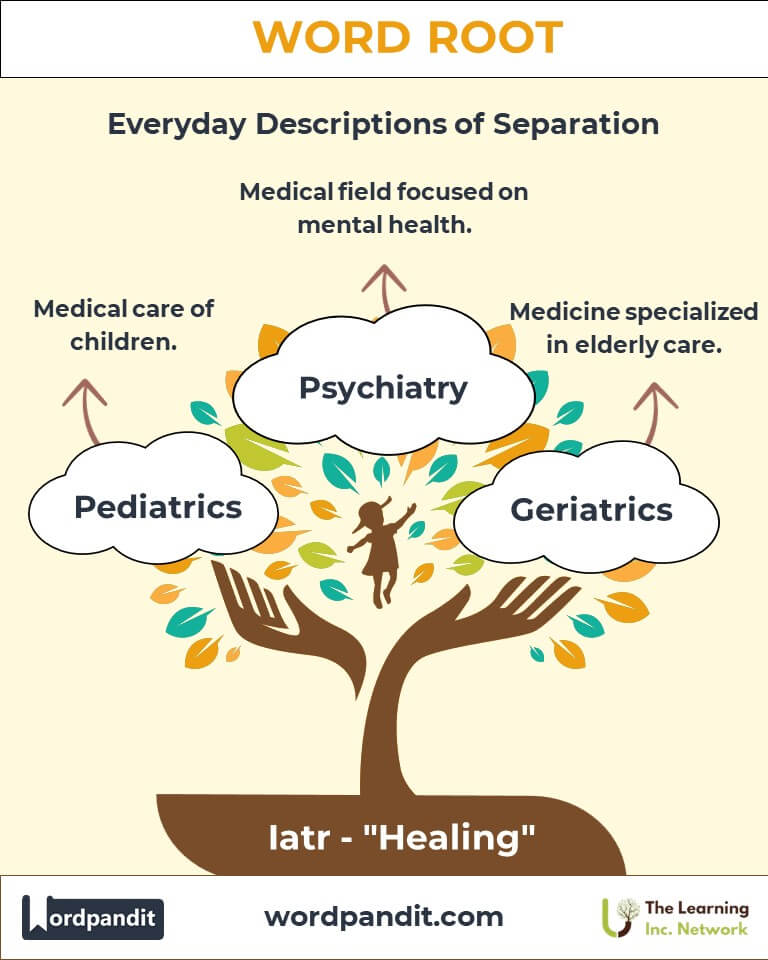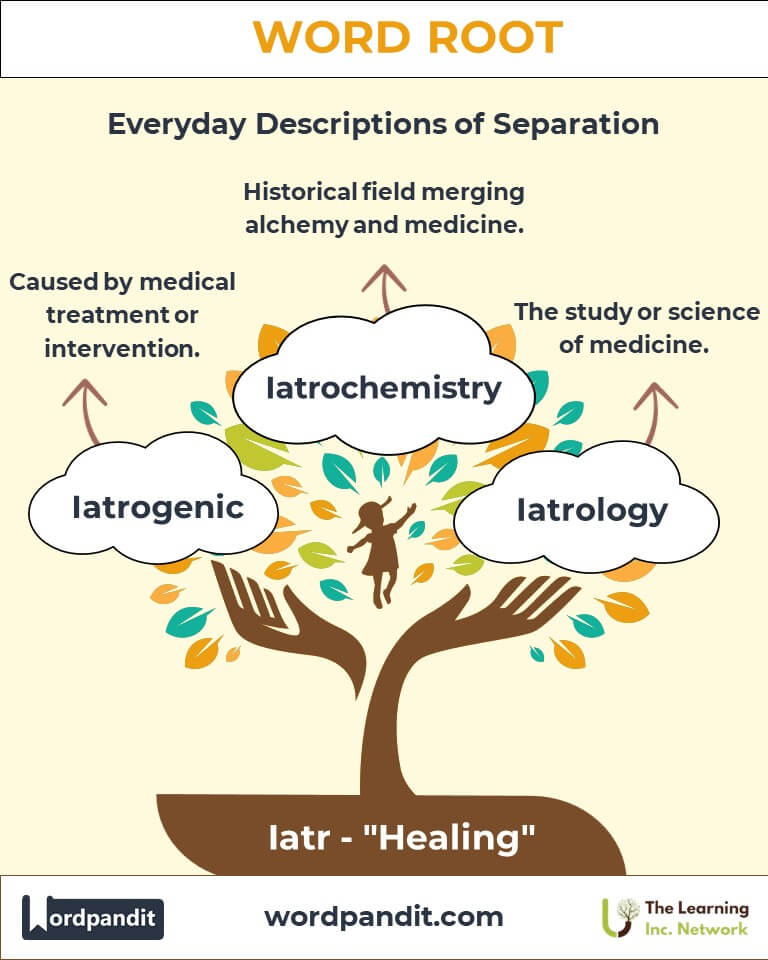Iatr: The Foundation of Healing in Medicine and Beyond
Discover the rich legacy of the root "iatr," derived from the Greek word for medical treatment or healing. From "pediatric" to "psychiatrist," this root underscores the timeless connection between care and cure, shaping the vocabulary of health and wellness.

Table of Contents
- Introduction: The Essence of Iatr
- Etymology and Historical Journey
- Mnemonic: Unlocking the Power of Iatr
- Common Iatr-Related Terms
- Iatr Through Time
- Iatr in Specialized Fields
- Illustrative Story: Iatr in Action
- Cultural Significance of the Iatr Root
- The Iatr Family Tree
- FAQs About the Iatr Root
- Test Your Knowledge: Iatr Mastery Quiz
- Conclusion: The Living Legacy of Iatr
Introduction: The Essence of Iatr
At the heart of every medical breakthrough and act of care lies the root "iatr." Pronounced "eye-atr," this Greek root signifies "healing" or "medical treatment." It forms the foundation of numerous terms that bridge ancient traditions and modern healthcare. From pediatrics to psychiatry, the influence of "iatr" can be seen in diverse medical disciplines, reflecting humanity's enduring quest for health and healing.

Etymology and Historical Journey
The root "iatr" originates from the Greek word iatros (physician or healer), rooted in iasis, meaning "healing" or "remedy." In ancient Greece, iatros referred to both physical and spiritual healers, embodying a holistic view of well-being. Over centuries, "iatr" evolved, merging with other roots and prefixes to create specialized medical terminologies. This linguistic journey highlights the root's adaptability and its integral role in the history of medicine.
Mnemonic: Unlocking the Power of Iatr
To remember "iatr," envision a caring doctor with a stethoscope labeled "IATR," symbolizing their dedication to healing.
Mnemonic Device:
“IATR is the doctor’s mantra—‘I Aim To Restore health.’”
Common Iatr-Related Terms
- Pediatric (pee-dee-atr-ik): Pertaining to the medical care of children.
Example: "The pediatric clinic provides vaccinations and checkups for children." - Psychiatrist (sigh-kai-uh-trist): A medical doctor specializing in mental health.
Example: "The psychiatrist developed a therapy plan for her patients." - Geriatrics (jer-ee-atr-iks): The branch of medicine focused on elderly care.
Example: "Geriatrics addresses the unique needs of aging populations." - Iatrogenic (eye-at-ro-jen-ik): Caused by medical treatment or intervention.
Example: "The condition was iatrogenic, resulting from the prescribed medication." - Iatrology (eye-at-rol-uh-jee): The study or science of medicine.
Example: "Her passion for iatrology inspired her to pursue medical research."
Iatr Through Time
- Hippocratic Era: Ancient healers used "iatr" to describe their role, setting the stage for medical ethics and practices still revered today.
- Middle Ages: Terms like "iatromathematics" emerged, blending medicine and astrology in healing practices.
- Modern Medicine: With advancements in science, "iatr" gave rise to precise terminologies like "iatrogenic," reflecting the complexities of healthcare.
Iatr in Specialized Fields
- Pediatrics: Focuses on the health and development of children.
Example: "Pediatricians are trained to handle both physical and emotional aspects of childhood growth." - Psychiatry: Addresses mental health disorders and treatments.
Example: "Psychiatrists combine therapy with medication to manage conditions like depression." - Iatrochemistry: A historical discipline combining alchemy and medicine.
Example: "Iatrochemistry laid the groundwork for modern pharmacology." - Geriatrics: Specializes in medical care for the elderly.
Example: "Advances in geriatrics have significantly improved the quality of life for seniors."
Illustrative Story: Iatr in Action
Dr. Elena, a compassionate pediatrician, faced a challenging day when a young patient came in with an unusual rash. Her extensive training in iatrology guided her to diagnose a rare allergic reaction. Collaborating with a psychiatrist to ease the family’s anxiety, Dr. Elena exemplified the interconnected power of "iatr" disciplines, ensuring both physical and emotional healing.
Cultural Significance of the Iatr Root
The root "iatr" underscores humanity's universal commitment to health. Ancient Greek healers symbolized wisdom and compassion, values still central to modern medicine. Today, "iatr" connects diverse cultures through shared medical advancements, reflecting a global dedication to well-being.

The Iatr Family Tree
- Med (Latin: "heal"):
- Medicine: The science of diagnosing and treating illness.
- Medical: Relating to the practice of medicine.
- Therap (Greek: "treatment"):
- Therapy: Treatment of physical or mental conditions.
- Psychotherapy: Therapy for mental health issues.
- Cure (Latin: "care for"):
- Curative: Capable of healing.
- Curator: Historically referred to a caretaker or overseer, including health.

FAQs About the Iatr Root
Q: What does "iatr" mean?
A: "Iatr" means "medical treatment" or "healing," derived from the Greek word iatros, which translates to "healer" or "physician." This root forms the basis of many terms in modern medicine, emphasizing care and recovery.
Q: What is the origin of the term "pediatric"?
A: The word "pediatric" comes from the Greek roots pais (child) and iatr (healing). Together, it signifies "healing of children" and represents the medical field dedicated to children's health and development.
Q: What does "iatrogenic" mean, and why is it significant in medicine?
A: "Iatrogenic" refers to conditions or complications caused by medical treatment or intervention. This term is important in modern healthcare as it highlights the need for caution and precision in treatments to avoid unintended side effects.
Q: How does "iatr" relate to psychiatry?
A: Psychiatry combines "iatr" (healing) with psyche (soul or mind), meaning "healing of the mind." Psychiatrists are trained medical professionals who address mental health issues, merging science and empathy to treat psychological conditions.
Q: What is geriatrics, and how does it connect to "iatr"?
A: Geriatrics is derived from geras (old age) and iatr (healing). This field specializes in caring for the elderly, focusing on age-related diseases and improving the quality of life for seniors.
Q: What is the significance of "iatrology"?
A: "Iatrology" refers to the study or science of medicine itself. Historically, it emphasized the theoretical and practical knowledge of healing, making it a cornerstone for understanding and advancing medical practices.
Q: What is the historical significance of "iatrochemistry"?
A: Iatrochemistry was a blend of alchemy and medicine popular during the 16th and 17th centuries. Practitioners believed in using chemical principles to treat diseases, laying the foundation for modern pharmacology and medical chemistry.
Q: How has "iatr" shaped modern medical terminology?
A: "Iatr" has influenced numerous medical terms, such as pediatrics, psychiatry, and geriatrics. Its consistent emphasis on healing underscores the linguistic and conceptual continuity between ancient and modern medical practices.
Test Your Knowledge: Iatr Mastery Quiz
1. What does the root "iatr" signify?
2. Which term refers to children’s medical care?
3. What does "iatrogenic" describe?
4. Which branch focuses on elderly health?
5. What is iatrology?
Conclusion: The Living Legacy of Iatr
The root "iatr" symbolizes the timeless art and science of healing. From ancient Greek physicians to today’s healthcare professionals, it captures the essence of care and cure. As medicine continues to evolve, the enduring influence of "iatr" reminds us of the shared human aspiration for health, compassion, and progress.












